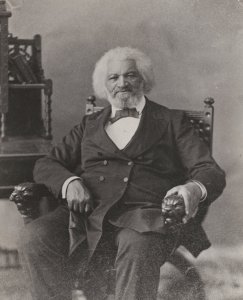Liberty Matters
Do We have a Moral Obligation to Help Other People?
 In "Frederick Douglass on the Right and Duty to Resist," Nicholas Buccola takes issue with my rejection of the notion that we have even an imperfect (i.e., unenforceable) duty to defend the rights of other people. Or, at least, Buccola contrasts my position with that of Frederick Douglass, which he seems to regard as better: "We do have a general duty to act in ways that, in our best judgment, will move us closer to realizing justice."
In "Frederick Douglass on the Right and Duty to Resist," Nicholas Buccola takes issue with my rejection of the notion that we have even an imperfect (i.e., unenforceable) duty to defend the rights of other people. Or, at least, Buccola contrasts my position with that of Frederick Douglass, which he seems to regard as better: "We do have a general duty to act in ways that, in our best judgment, will move us closer to realizing justice."I maintain, in contrast, that the only natural duty we have to others is the "negative" duty (or moral obligation) to abstain from violating their rights. So-called "positive" duties, such as the obligation to help those in need or the obligation to protect others from harm, are purely a matter of individual choice. There is no "duty" attached to these and similar actions.
It should be understood that there are many good and even virtuous actions that are not moral obligations. It is a mistake to classify all good actions as falling into the category of obligatory actions. We incur positive obligations only insofar as we enter into voluntary agreements with other people. These obligations may be "perfect," as when we sign a formal contract; or they may be "imperfect," as when we promise a friend that we will help her move. If I promise a friend that I will help her move, this is a benevolent gesture on my part, but it is not morally obligatory. If I do not make this promise, I could not reasonably be accused of defaulting on a moral obligation. If I make the promise this would be because I value her friendship and want to help her out. There need be no sense of obligation motivating my promise—unless, perhaps, the person had previously helped me move, and I feel obligated to reciprocate.
A person for whom individual freedom is a fundamental value will naturally take an interest in the principles of justice. Slavery will be abhorrent to him or her, since it flatly contradicts the fundamental value of freedom. It is therefore understandable why this person might join the antislavery cause without regarding his or her participation as a duty.
Of course, most abolitionists did consider their crusade against slavery to be a moral duty. But I suggest that this conviction flowed more from their religious beliefs than from a purely secular theory of rights. Many of the abolitionists embraced some version of evangelical Christianity and shared its fervor for moral reformation typical of that movement in antebellum America. Although slavery was understood to be a violation of rights (especially the right of self-ownership), these evangelical Christians viewed slavery first and foremost as a major sin that should be eradicated, along with other sins. This viewpoint helps to explain why most major abolitionists—with rare exceptions, such as Lysander Spooner (who was a deist)—also campaigned for the compulsory prohibition of alcohol. This position makes little sense if viewed purely from the perspective of the natural right of self-ownership. But it makes far more sense if we understand it from the perspective of the evangelical crusade to eliminate sin from American society. This obligation came directly from God, not from a theory of rights.[58]
Endnotes
[58.] I am currently writing a series of essays on the abolitionists and prohibition. It begins with "Abolitionism: Slavery as Sin," at https://www.libertarianism.org/columns/abolitionism-slavery-sin. See the subsequent essays for more information.
Copyright and Fair Use Statement
“Liberty Matters” is the copyright of Liberty Fund, Inc. This material is put on line to further the educational goals of Liberty Fund, Inc. These essays and responses may be quoted and otherwise used under “fair use” provisions for educational and academic purposes. To reprint these essays in course booklets requires the prior permission of Liberty Fund, Inc. Please contact oll@libertyfund.org if you have any questions.